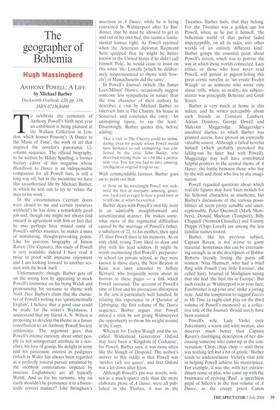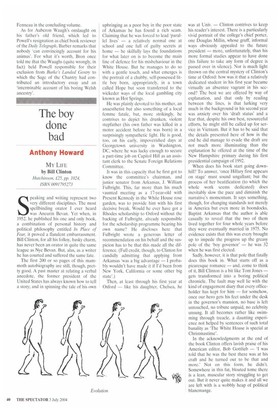The geographer of Bohemia
Hugh Massingberd
ANTHONY POWELL: A LIFE by Michael Barber Duckworth Overlook, £20, pp. 338. ISBN 0715630490 To celebrate the centenary of Anthony Powell's birth next year an exhibition is being planned at the Wallace Collection in London, which houses Poussin's 'A Dance to the Music of Time', the work of art that inspired the novelist's panoramic 12volume sequence. The official biography, to be written by Hilary Spurling, a former literary editor of this magazine whose Handbook to Dance is an indispensable companion for all Powell fans, is still a long way off, but in the meantime we have this unauthorised life by Michael Barber, in which he sets out to try to 'relate the man to his work'.
In the circumstances ('certain doors were closed to me and certain resources withheld') he has done a remarkably good job and, though one might not always find oneself in agreement with him or feel that he may perhaps have missed some of Powell's subtler nuances, he makes a mass of stimulating, thought-provoking points. Like his previous biography of Simon Raven (The Captain), this study of Powell is very readable: indeed I have read it twice in proof with immense enjoyment and I am looking forward to another session with the book itself.
Unfortunately, though, Barber gets off on the wrong foot by appearing to mock Powell's insistence on his being Welsh and pronouncing his surname to rhyme with Noel. Pace Barber's claim that the character of Powell's writing was 'quintessentially English', I believe that a good case could be made for the writer's Welshness. I understand that my friend A. N. Wilson is proposing to develop the theme in a future contribution to an Anthony Powell Society conference. The argument goes that Powell's intense curiosity about other people (a not unimportant attribute in a novelist), his love of gossip, his delight in irony and his passionate interest in pedigrees (which in Wales has always been regarded as a perfectly natural pursuit untainted by the snobbish connotations imputed by insecure Englishmen) are all typically Welsh. And as for his surname, why on earth shouldn't he pronounce it in a historically correct manner? Like Stringham's
assertion in A Dance, while he is being restrained by Widmerpool after Le Bas. dinner, that he must be allowed to get in and out of his own bed, this seems a fundamental human right. As Powell rejoined when the American diplomat Raymond Seitz quipped that he might be better known in the United States if he didn't call himself 'Pole', he would cease to insist on this when 'the Lowells 'which he deliberately mispronounced to rhyme with 'bowels] of Massachusetts did the same'.
In Powell's Journals (which, like James Lee s-Milnes' Diaries, occasionally suggest someone less sympathetic in nature than the true character of their author) he describes a visit by Michael Barber to interview him at The Chantry, his house in Somerset, and concludes the entry: 'An uninspiring figure, to say the least.' Disarmingly, Barber quotes this, before adding:
That a visit to The Chantry could be intimidating, even for people whom Powell would have hesitated to call uninspiring, was confirmed by the critic John Bayley, who described staying there 'as a bit like a permanent viva. You felt you had to have amusing, intelligent or original things to say.'
With commendable fairness, Barber goes on to point out that
to those on his wavelength Powell was reckoned the best of company: amusing, generous, loyal and as eager to hear a good story as to tell one, at which he excelled.
Barber deals with Powell's own life story in an admirably straightforward and unsentimental manner. He makes somewhat more of the regimental difficulties caused by the marriage of Powell's father, a subaltern of 22, to his mother, then aged 37, than Powell does in his memoirs. As an only child, young Tony liked to draw and play with his lead soldiers. It might be worth mentioning that Powell's preparatory school (or private school, as they were known in those days), the New Beacon in Kent, was later attended by Jeffrey Bernard, who frequently wrote about its horrors in these pages — a link which Powell savoured. The account of Powell's time at Eton and his precocious absorption in the arts is particularly well handled. In relating this experience to A Question of Upbringing, the first volume of the Dance sequence, Barber argues that Powell missed a trick by not giving Widmerpool the opportunity to throw his weight around in the Corps.
Whereas for Evelyn Waugh and the socalled 'Brideshead Generation' Oxford may have been a 'Kingdom of Cockayne', for Powell, Barber says, it was more often like the Slough of Despond. The author's answer to this riddle is that Powell was 'neither rich nor queer', and that Oxford was a let-down after Eton.
Although Powell's pre-war novels, written in a much sparer style than the more elaborate prose of A Dance, were all published in the Thirties, it was in the
Twenties, Barber feels, that they belong. For the Twenties was a golden age for Powell, when, as he put it himself, 'the bohemian world of that period faded imperceptibly, on all its sides, into other worlds of an entirely different kind'. Barber grasps the essential point about Powell's novels, which was to portray the way in which those worlds connected. Lazy critics, or those who have never read Powell, will persist in pigeon-holing this great comic novelist as 'an ersatz Evelyn Waugh' or as someone who wrote only about toffs. when, in reality, his subjectmatter was principally Bohemia and Grub Street.
Barber is very much at home in this milieu, and he writes perceptibly about such friends as Constant Lambert, Adrian Daintrey, George Orwell and Malcolm Muggeridge. Muggeridge's unedited diaries, to which Barber was granted access, have proved an especially valuable source. Although a failed novelist himself (which probably provoked the falling-out he later had with Powell), Muggeridge may well have contributed helpful pointers to the central theme of A Dance, the battle between those who live by the will and those who live by the imagination.
Powell regarded questions about which real-life figures may have been models for his fictional characters as anathema, but Barber's discussions of the various possibilities all seem pretty sensible and unexceptionable. Peter Ouennell (Mark Members), Donald Maclean (Tompsitt), Billy Chappell (Norman Chandler) and Tommy Phipps (Chips Lovell) are among the less familiar names touted.
Barber, like his previous subject, Captain Raven, is not averse to gamy material. Sometimes this can be entertaining enough, as in the description of Bobbie Roberts literally boring the pants off women. Nina Hamnett, who had a brief fling with Powell (my little Etonian', she called him), boasted of Modigliani saying that she had 'the best tits in Europe'. But such cracks as `Widmerpool is in your face; Farebrother is up your arse' strike a jarring note, And the temptation to suggest Faeces in My Time (a rugby-club play on the third volume of Powell's memoirs) as a collective title of the Journals should surely have been resisted.
Powell's wife, Lady Violet (née Pakenham), a warm and witty woman, also deserves much better than Captain Raven's disobliging description of her discussing someone who came up in the conversation: 'Chop, chop, chop — until there was nothing left but a bit of gristle.' Barber tends to underestimate Violet's vital role in helping Powell achieve his masterpiece. For example, it was she, with her extraordinary sense of plot, who came up with the brainwave of reviving 'Paul', a speechless pupil of Sillery's in the first volume of A Dance, as the creepy priest Canon Fenneau in the concluding volume.
As for Auberon Waugh's onslaught on his father's old friend, which led to Powell's resignation as chief book reviewer of the Daily Telegraph. Barber remarks that nobody 'can convincingly account for his animus'. For what ifs worth, Bron once told me that the Waughs (quite wrongly, in fact) held Powell responsible for their exclusion from Burke's Landed Gentry to which the Sage of the Chantry had contributed an introductory essay and an 'interminable account of his boring Welsh ancestry'.



































































 Previous page
Previous page